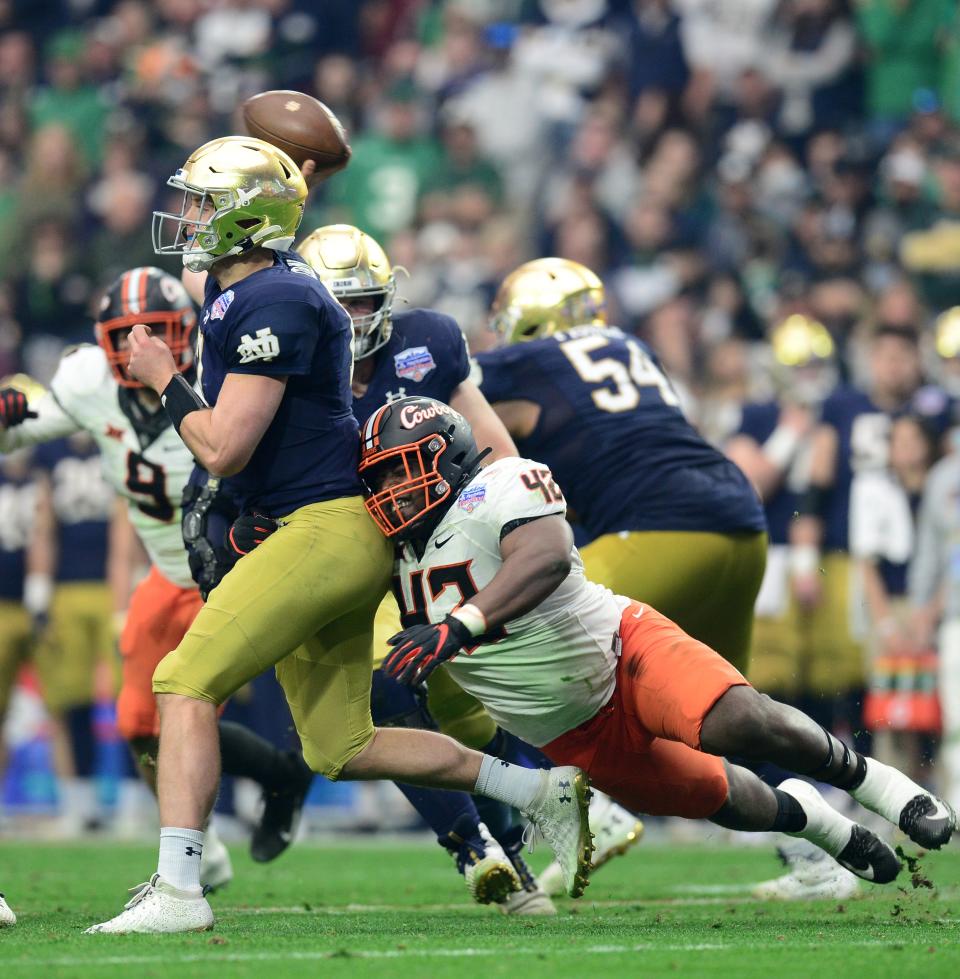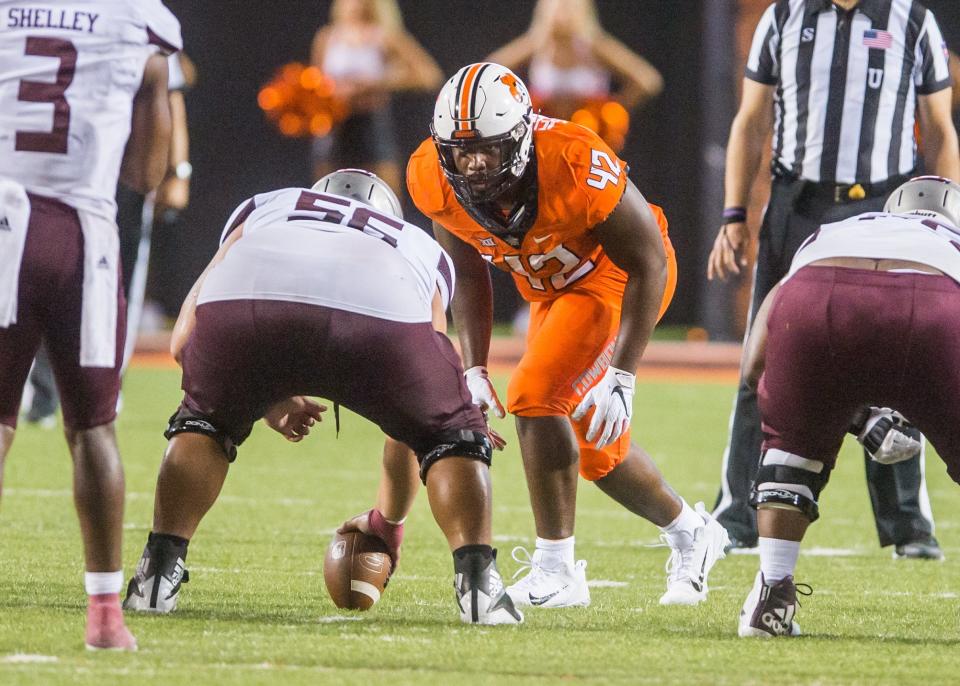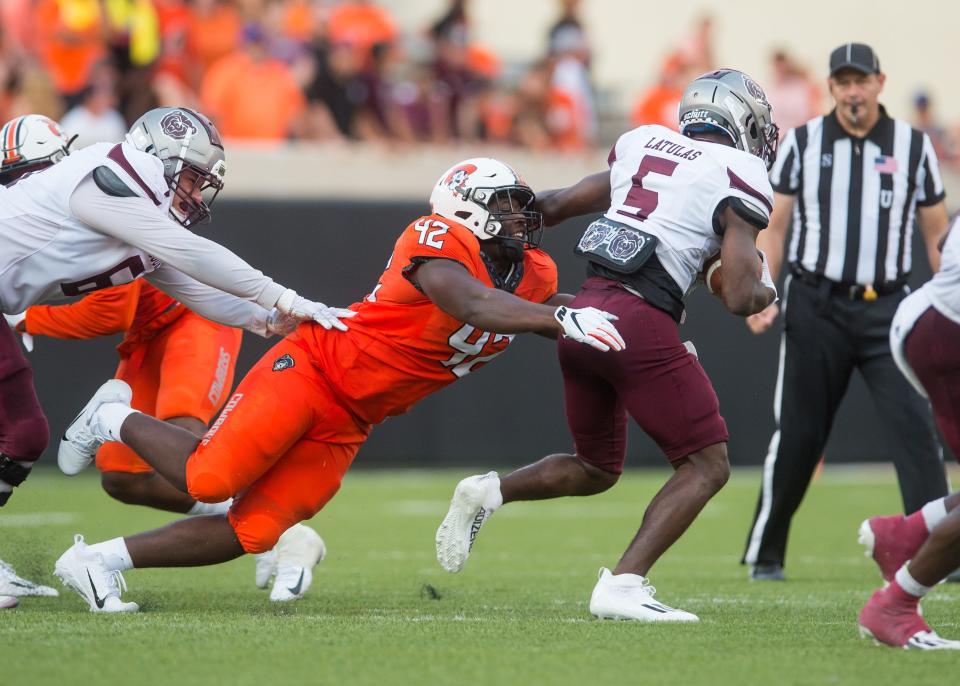How defensive lineman Jayden Jernigan navigated myocarditis to find chance with Missouri football

Jayden Jernigan was forced to step away.
Oklahoma State's first home game of 2020 saw the Cowboys hosting Tulsa. Jernigan went into the Cowboys locker room and was struck by something he didn't see. His jersey and helmet weren't in his locker.
That's when it started to feel real: This was his first break from playing football since he was 4 years old. What stung most was that it wasn't his choice.
"I just felt empty," Jernigan said. "The first game out there, I can't play and it's not an injury that anybody sees."
More: What to expect from Blake Baker's defense and how the spring factors into 2022 QB battle
Jernigan contracted COVID-19 prior to the 2020 season and missed the entire campaign. But it was more than just the disease. COVID-19 also caused Jernigan to develop myocarditis, an inflammation of the heart muscle.
The defensive lineman wasn't just fighting off the virus. He was navigating the disease and a heart condition that could be fatal if not treated properly.
That forced Jernigan to the sidelines.
"I was just done," he said.
For an entire season, he had to watch as Oklahoma State played its way to an 8-3 record and a 37-34 win over Miami in the Cheez-It Bowl. COVID-19 and myocarditis took him away from earning a chance to prove he's a Power Five starter.
That chance is what brought Jernigan to Missouri, and he's aiming to prove he can be a high-caliber defensive tackle in the Southeastern Conference with an eye on the National Football League.
More: Jaguars RB Ryquell Armstead developed myocarditis, couldn't 'do anything' for 8 months during COVID-19 battle
To find himself in Columbia, Jernigan first found himself battling the pandemic during a time where information was limited but the fear was palpable.
"Everybody was scared," Jernigan said. "Nobody knew anything, so they just kept telling me just wait, we don't know. And I feel like that's just all it was."

Understanding myocarditis
Myocarditis isn't an uncommon condition.
It's a condition, sometimes brought on by other viruses, that inflames the middle walls of the heart muscle.
According to the Mayo Clinic, inflammation can reduce a heart's ability to pump and can cause arrhythmias, which is when the heart has rapid beats or irregular heart rhythms.
Dr. Brian Bostick, MU Health Care cardiologist, said myocarditis symptoms can be confused with the common cold or just slight heart palpitations.
"We're seeing more myocarditis with COVID," Bostick said. "Especially in the athlete, it becomes challenging to deal with it. Most of the time it's mild."
More: Storylines to watch as Mizzou football kicks off spring practice
The challenges for athletes go further than just trying to just shrug off symptoms.
If those symptoms go untreated, they could cause sudden death.
"Anytime there's inflammation in the heart, the biggest thing we worry about with athletes is if that inflammation triggers an arrhythmia of their heart," Bostick said. "It's maybe one of the most common causes of sudden death in an athlete."
Bostick said 5% to 22% of cases of myocarditis see an arrhythmia. However, it depends on the case and certain variables. This especially rings true for bigger athletes, particularly defensive linemen like Jernigan.
It isn't that Jernigan himself was more susceptible to myocarditis. It's that athletes who have more muscle or body mass put more strain on the heart.
That extra strain is one of a few things doctors look for when ensuring they can completely treat myocarditis.
"Especially for these big athletes, the heart has to do a lot more work," Bostick said. "You've got to take into account BMI and family history to look for things like is there high blood pressure as well."
Bostick said myocarditis is something treated with immunosuppressants and anti-inflammatory drugs, but it's a condition that requires patience.
"I don't wanna scare anybody, but I tell them, 'Hey, we want to take this seriously because there is that chance that your heart stops," Bostick said. "We want to get you back to your full potential and not have you limited when you go back out there.'"
Break from football
The hardest part of the wait for Jernigan was watching.
Not only did he watch his team play without him, but he also watched his roommates, who all contracted COVID-19 at the same time he did, get back to football.
Why did they get to play again, but was he still sidelined? Why was he told he couldn't play because of an unknown disease that others had contracted and recovered from?
Jernigan's mind wandered to the idea that his days as a defensive lineman were over.
"At one point I thought I wasn't ever gonna really play football anymore," Jernigan said. "I really started focusing more on academics, took more classes."
Jernigan immersed himself in everything but football. While he still supported his teammates, he started to shut the game out. After Oklahoma State's third game of the 2020 season, he left Stillwater and came back late that November.
Jernigan joined clubs like "Dialogue 4 Change," which allowed him to meet other students and converse on challenges and topics. Jernigan and fellow club members set out boxed lunches for other students and held discussions.
"I integrated myself into other things so I could really get my mind off of it," Jernigan said. "I feel like that helped me grow as a person because I got a lot more connections than I already had just being a football player."
His playing days weren't over, though.
Jernigan was retested in January 2021 and was almost cleared by spring ball last March. Once he was fully cleared, he set his sights back to the field.
"When I got cleared and was able to come back, I still had to go through tests," Jernigan said. "I had to go through all these tests fully, get cleared and after that, it was full forces ahead."
Jernigan returned to play for Oklahoma State in the 2021 season. He recorded 22 tackles, two tackles for loss, two sacks and a forced fumble as he helped Oklahoma State to a win in the Fiesta Bowl over Notre Dame.
After the bowl game Jan. 1, he entered the transfer portal.
On Jan. 2, he announced he was a Missouri Tiger.
"It was difficult at times and it was fun at times," Jernigan said. "At the end of the day, it led me here."
How Jayden Jernigan chose Mizzou football

When Tigers coach Eli Drinkwitz watched the Cowboys come back to beat the Irish on New Year's Day, he watched Jernigan stick out.
The defense snuffed the Irish in the second half after allowing 28 first-half points.
"He played really well," Drinkwitz said on Signing Day in February.
That impression helped lead Jernigan to Missouri, which was in dire need of some help at defensive tackle.
After a mass of transfers and graduations, Jernigan comes to Missouri with a chance to earn what he wants.
"I just want the opportunity to go ahead and start somewhere," Jernigan said. "I felt like I deserved it and I just didn't wanna do that split time anymore. It's getting to a point where this will be my fourth season in college and I've produced enough to where I feel like I've earned that spot."
Jernigan prides himself on being a quick defensive lineman. He has moves that can get him around bigger offensive linemen before they have a chance to push him around. He learned from Brandon Tucker, a private defensive line coach who has mentored the likes of Jacquies Smith, Poona Ford and Malik Collins, all of whom are in the NFL.
That's the goal Jernigan has set. It's why he came to Missouri. This spring, Jernigan can earn that starting spot on the Tigers' defensive line and make the patience of recovering from myocarditis worth it all in the end.
"Most of the things said myocarditis lasted three to four months," Jernigan said. "It lasted longer for me, but it was a blessing in disguise."
Chris Kwiecinski is the sports editor for the Columbia Daily Tribune, overseeing University of Missouri and Boone County sports coverage. Follow him on Twitter @OchoK_ and contact him at CKwiecinsk@gannett.com or 435-414-3261.
This article originally appeared on Columbia Daily Tribune: How Jayden Jernigan navigated myocarditis to land with Mizzou football

